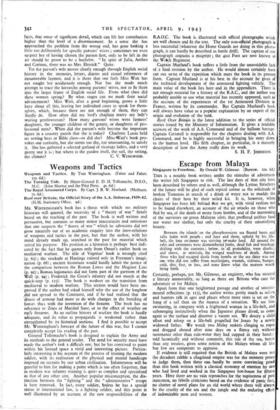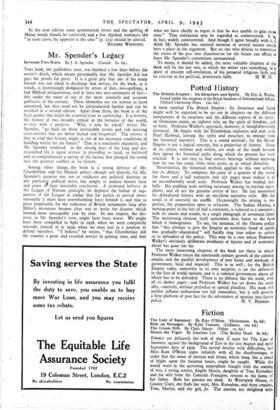Escape from Malaya
Singapore to Freedom. By Oswald W. Gilmour. (Burrow. so& 6d.)
Tins is a notable book . written tinder the stimulus of adventures the writer left Singapore to risk. The last days of that city have been described by others and as well, although the Lytton Stracheys of the futurewill be glad of such topical colour as the solicitude of broken Tommies in search of a drink of water not to muddy the -chairs of their host by their soiled kit. It is, however, when Singapore has been left behind that we get, with vivid realism not to be found elsewhere, an account of the air attacks on those who fled by sea, of the death of many from bombs, and of the marooning of the survivors on green Malayan islets that proffered neither food nor water nor shelter, but only the cruelty of -their unsatisfying beauty.
Between the islands'on the phosphorescent sea floated boats and rafts laden with people ; and here and there, upheld by his lifebelt, she lone swimmer was striving toomake land. All around the rafts and swimmers were dismembered limbs, dead fish and wreckage drifting with the currents ; below, in‘all probability, were sharks ; and above, at intervals, the winged machines of death. Among those who had -escaped death. from bombs or the sea there was not one who slid . not :suffer from mutilations, wounds, sickness, 'hunger, cold, dirt,. fear, Or loss, and none /new wfiat the morrow would
bring forth. • Certainly, perhaps, not Mx. Gilinour, an engineer, who has secured a literary immortality,, so 'long as there are Britons who care for adventure or for Malaya. Apart from that one heightened passage and another of unsentimental reflections (p. 113), the author writes pretty much as sailors and hunters talk in ages and places where more store is set on the
hang of a sail than on the nuance of a sensation. We see him swimming, in company with a frightened woman in a life-belt, and
submerging instinctively when the Japanese planes dived, to come
again to the surface and discover a vacant sea. We descry a child afloat and asleep on a life-belt propelled fof,hours by a newly widowed father. We watch two Malay stokers rlinging to ropes and dragged aboard after nine days on a flimsy raft without sustenance other than rain-water they had cupped in their hands: told laconically and without comment, this tale of the sea, better than any treatise, gives some notion of the Malays whom all like but few are competent to appraise.
If evidence is still required that the British of Malaya were net the decadent rabble a chagrined empirewas for the moment prone to judge them, then there can, hardly be moreconvincing prod than this book written with a classical economy of emotion by one who had lived and worlted in the Singapore hot-house for fifteen years. Here there are no vain reproaches for the supineness of past statesmen, no febrile criticisms based on the evidence of panic
no chatter of novel plans for an old world where there will always be the cruelty of the sea and the jungle and the enduring effort of indomitable men and women. In the next edition some grammatical errors and the spelling of Malay words should be corrected, and a few slipshod sentences like "in most cases, the opposite is the case" (p. 113) should be altered.
RICHARD WINSTEDT.























 Previous page
Previous page